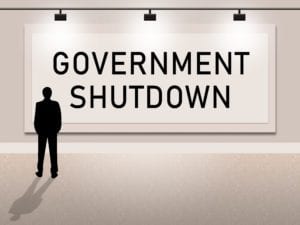15 Jan The Government Shutdown and Real Estate: The Affects on Buyers and Homeowners
Today marks the 25th day of the partial government shutdown, now the longest in U.S. history. You may be in the unfortunate position of being forced to make difficult decisions just to keep your finances somewhat afloat if you’re one of the many hundreds of thousands of Americans affected by the shutdown. For many government employees, this past Friday was also the first day without a full paycheck. Some people have resorted to using their savings accounts to stay current with their mortgages and bills; others have been seeking personal loans to cover their monthly expenses. So, what does this partial shutdown mean for the Minnesota real estate market?
The Frozen American Dream
For many, buying a home signifies financial ability and stability in employment. Without being able to verify salaries, realizing the dream of homeownership has become a lot harder for the moment. There is a silver lining to this government shutdown cloud, however: The Veterans Department is fully funded for the 2019 fiscal year, so all VA operations will continue uninterrupted during the shutdown. And, because all Veterans Affairs (VA) loans are deemed an essential function, they are being funded and closed as well.
The shutdown is not only affecting government employees, recipients of government-funded programs, and Minnesota small business owners, it’s also throwing a giant wrench into plans for those who have already started the process of buying a home. Because new government-guaranteed loans cannot be generated right now (and applications for these loans can’t be put in, either), those who are ineligible for a conventional mortgage are stuck like flies in honey until the shutdown is over. Government employees may also be experiencing a stall in salary verification, as well.
Those affected include home buyers in flood-prone areas that are unable to obtain flood insurance through the National Flood Insurance Program, which is needed to close on the home purchase. Those relying on government-funded Federal Housing Assistance (FHA) also cannot close on their loans. Buyers who have sales in process, but whose loans are on hold and do not yet have a commitment letter from their lender, may be worried that sellers may want to move on to other home buyers who do have an approved loan. In addition, borrowers who are self-employed are particularly affected by the limited or lack of access to federal income tax transcripts.
On the Horizon
There is some good news, though: The Internal Revenue Service has now begun to process requests for tax transcripts through its Income Verification Express Service (IVES) program, which is used by lenders to verify income. Keep in mind that there may be delays in income verification through IVES. The IRS also announced that it will be recalling a myriad of furloughed employees in order to start processing tax returns and issue refunds to taxpayers beginning January 28, 2019.
Some lenders are working around these shutdown-induced hiccups, such as conditionally approving loans and confirming income once this political game comes to an end and the government resumes normal function. Unfortunately, if the stalemate in this chess game between Congress and the President persists much longer, it could continue to wreak havoc and stall our economic growth. In addition, it could continue to hinder many home buyers from pursuing the American dream, as well as current homeowners who are in need of government-funded loans to fix their properties.
Contact Jeff Anderson and The Anderson Team at 612-386-8600 and he can help navigate your purchase and loan through this difficult period.


Sorry, the comment form is closed at this time.